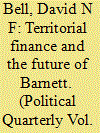| Srl | Item |
| 1 |
ID:
174831


|
|
|
|
|
| Summary/Abstract |
Military veterans and their families face a multiplicity of challenges once they transition from service. Even though more American private and public-sector organizations are engaged in studying the needs of veterans and their families through need assessments, few assessments are comprehensive analyses of the challenges they face. This systematic review of 61 need assessments from 2007-2018 in the United States summarizes findings on 18 veterans issues. While most studies addressed issues relating to accessing U.S. Department of Veterans Affairs health and benefit services, mental health, employment, and homelessness, gaps in the literature emerged, particularly regarding ethnic and sexual minority, rural and elderly veterans, and National Guard/Reserve servicemembers. Large cities and states with varying degrees of military presence were frequent regions of study, with national think tanks, nonprofit organizations, and public universities conducting most need assessments. Future assessments should address persistent inequities in coverage among communities and topics of study using mixed-method research and survey design.
|
|
|
|
|
|
|
|
|
|
|
|
|
|
|
|
| 2 |
ID:
138877


|
|
|
|
|
| Summary/Abstract |
This article traces the changing funding relationships between Scotland and the UK government. Beginning from the Barnett Formula, it examines how the changing support within Scotland for greater political autonomy from Westminster has influenced the mechanisms that have determined Scotland's fiscal structure. Increasing support for the SNP, and then for the Yes campaign in the September 2014 independence referendum, has led to a mixture of new powers being granted to the Scottish Parliament. The Scotland Act 2012 extends the Scottish government's control over income tax and some other small taxes. Although independence was rejected by the Scottish people in September 2014, the ‘Vow’ made by the Westminster parties immediately before the vote is leading to far-reaching changes in the UK's fiscal structure. This will cause a very substantial change in intergovernmental relations within the UK, which the Barnett Formula may not survive.
|
|
|
|
|
|
|
|
|
|
|
|
|
|
|
|